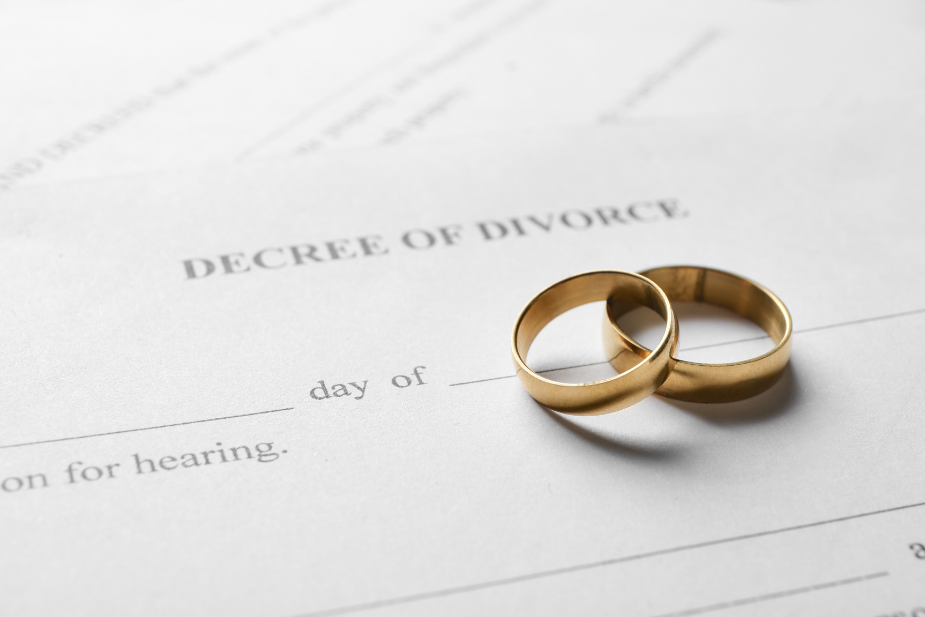Divorce marks a significant life transition, often accompanied by emotional and legal complexities. This guide aims to provide a clear and comprehensive roadmap to the divorce process in Queensland, outlining each essential aspect to help you move forward with greater clarity and confidence.
While property settlement and parenting arrangements are important considerations in separation, these matters are typically resolved prior to finalising your divorce. This guide focuses specifically on the divorce process itself.
This guide covers:
-
Understanding the Essentials: Eligibility for Divorce in QLD
-
Your Step-by-Step Guide: The Process of Filing for Divorce in Queensland
-
Navigating Potential Hurdles: Challenges in the Divorce Process
-
The Broader Legal Impacts of Divorce: Why Finalising Your Divorce Matters
While this guide offers valuable information, it is important to remember that every divorce is unique, and seeking personalised legal advice is always recommended. At Butler McDermott Lawyers, we have a long-standing history of expertise in family law making us well-positioned to provide the guidance and support needed during this challenging time.
Understanding the Essentials: Eligibility for Divorce in QLD
The dissolution of a marriage in Queensland is governed by specific legal criteria, primarily focusing on the irretrievable breakdown of the relationship. This breakdown is legally established through a period of separation.
The 12-Month Separation Requirement
initiate divorceThe primary legal requirement for obtaining a divorce in Queensland is demonstrating that the marriage has irretrievably broken down. This is evidenced by spouses having lived separately and apart for a continuous period of at least 12 months immediately preceding the date of filing the divorce application.
It is important to note that neither spouse needs the other’s consent to file an Application for Divorce, and the court does not consider who was at fault for the marriage breakdown. The legal system acknowledges that relationships can end without assigning blame.
Recognising the complexities of human relationships, the law allows for a single period of reconciliation between the separated parties for up to three months. This period of getting back together will not restart the 12-month separation period. For instance, if a couple separates for four months, reconciles for almost three months, and then separates again for another eight months, they are considered to have met the 12-month separation requirement.
Furthermore, physical separation is not always a straightforward matter of living in different residences. The concept of ‘separation under one roof’ is recognised under Australian law. In situations where separated spouses continue to reside in the same home, the court will consider various factors to determine if a genuine separation has occurred. These factors include whether the couple sleeps in separate beds, engages in sexual activity, shares meals and domestic duties differently than when married, shares finances and bank accounts, and how they are perceived as a couple by family and friends.
Residency and Citizenship Criteria
In addition to the separation period, specific residency and citizenship requirements must be met for an Australian court to have jurisdiction to grant a divorce. At least one of the parties applying for the divorce must be an Australian citizen, consider Australia their permanent home and live in Australia, or ordinarily live in Australia and have done so for at least 12 months before filing the application.
These broad criteria ensure that individuals who have established significant connections with Australia can access the Australian legal system for divorce, regardless of their birthplace or citizenship status. Marriages that took place overseas are generally recognised as valid in Australia, provided they were legally valid according to the laws of the country where the marriage ceremony occurred.
Proving Irretrievable Breakdown
The 12-month separation period serves as the primary evidence to the court that the marriage has irretrievably broken down and that there is no reasonable likelihood of reconciliation. The Australian legal system operates on a ‘no fault’ basis, meaning that the reasons for the breakdown of the marriage are not a factor in granting a divorce.
Marriages Under Two Years
For couples who have been married for less than two years, an additional requirement was required to attend counselling with a family counsellor and file a certificate confirming this with the court before a divorce application can be processed.
Following a recent legislative update: All marriages, regardless of duration, now follow the same divorce process. The Family Law Amendment Act 2024 eliminated the previous requirement for couples married less than two years to attend counselling before applying for divorce. This means that whether you have been married for six months or sixty years, you only need to meet the standard requirements: 12 months of separation, Australian residency/citizenship criteria, and completion of the divorce application through the Commonwealth Courts Portal. No counselling certificates or additional waiting periods apply to any marriage duration.
Takeaway Points:
A minimum of 12 months of separation is generally required to prove irretrievable breakdown of the marriage
At least one party must meet Australian residency or citizenship criteria
Australia operates on a ‘no fault’ divorce system
Separation can occur even while living under the same roof, but requires specific evidence
All marriages follow the same streamlined process regardless of duration (2025 reform eliminated previous two-year counselling requirements)
Your Step-by-Step Guide: The Process of Filing for Divorce in Queensland
Once the eligibility requirements are met, the process of filing for divorce in Queensland involves several key steps, primarily managed through the Federal Circuit and Family Court of Australia.
Deciding on a Sole or Joint Application
The first step is to decide whether to file a sole application (one person applies) or a joint application (both parties apply together). A joint application has the advantage of not requiring the applicant to ‘serve’ the divorce papers on the other party, as both are already aware and consenting to the application.
Registering and Using the Commonwealth Courts Portal
The primary method for filing a divorce application in Australia is online through the Commonwealth Courts Portal. To use the portal, applicants need to register for an account, which allows them to file documents, pay fees, and track the progress of their case.
Gathering Necessary Documentation
Before starting the online application, it is essential to gather all the required documentation. This typically includes:
A copy of the marriage certificate (a colour copy of both sides is often required)
If the marriage certificate is in a foreign language, a certified English translation is necessary
Proof of identity, such as a driver’s license or passport
Completing and Lodging the Online Application
Once registered on the Commonwealth Courts Portal and all documents are ready, applicants can begin the online Application for Divorce. The form requires detailed information about the applicant(s), their spouse, the marriage, and any children of the marriage.
After completing the online form, applicants will need to print and sign an Affidavit for eFiling Application (Divorce). If it is a sole application, only the applicant needs to sign in front of a lawyer or Justice of the Peace (JP). For joint applications, both parties must sign in the presence of an authorised witness. The signed affidavit then needs to be uploaded to the portal along with the other supporting documents.
Understanding and Paying the Filing Fees
There is a fee associated with filing a divorce application. As of July 2024, the standard filing fee is $1100. However, a reduced fee of $365 may be available to those who hold a concession card or are experiencing financial hardship. Evidence, such as an affidavit, will need to be provided to support an application for a reduced fee.
Serving the Application (for Sole Applications)
If a sole application for divorce is filed, the applicant is responsible for ‘serving’ a copy of the application and all relevant documents on their spouse. This ensures that the other party is officially notified of the divorce proceedings. The applicant cannot serve the documents themselves; service must be carried out by a third party over the age of 18.
Service can be done in person or by prepaid post to the respondent’s last known address, with a requirement for the respondent to sign and return an Acknowledgement of Service form. Proof of service must be filed with the court.
What Happens After You File?
Once the divorce application is lodged, the Federal Circuit and Family Court of Australia will set a hearing date. However, personal attendance at the hearing is not always required. For joint applications where there are no children under 18, attendance is usually not necessary.
The divorce order is typically granted in two stages. If the court is satisfied that all requirements have been met, an initial court order will be made. The final divorce order, which legally ends the marriage, becomes effective one month and one day after the date of the Divorce Hearing. It is only after the final divorce order is issued that a person is legally free to remarry.
Takeaway Points:
The divorce process begins with an online application via the Commonwealth Courts Portal
Essential documents include the marriage certificate and identification
A filing fee is payable, with potential reductions for financial hardship
Sole applicants must ensure the other party is served with the divorce papers
The divorce order is granted in two steps, with a waiting period before it becomes final
Navigating Potential Hurdles: Challenges in the Divorce Process
While many divorces proceed relatively smoothly, various challenges and complexities can arise during the divorce process itself, requiring careful navigation and expert legal assistance.
Dealing with an Uncooperative Spouse
One of the most significant challenges in divorce can be dealing with an uncooperative spouse who may refuse to engage in the process or delay proceedings. In such situations, it is crucial to remain calm and document all interactions. Seeking legal advice early is essential to understand your rights and available legal remedies.
Your lawyer can manage communication on your behalf, gather necessary documentation, and if necessary, file motions with the court to compel the uncooperative spouse to comply with court orders or participate in the process.
Separation Under One Roof: Providing Sufficient Evidence
For couples who have separated but continue to live under the same roof, proving the separation to the court requires detailed evidence. This typically involves providing a comprehensive affidavit detailing the separate living arrangements and potentially corroborating evidence from family or friends who are aware of the separation. The more detailed and convincing the evidence, the greater the likelihood of the court accepting that a genuine separation has occurred.
Takeaway Points:
Dealing with an uncooperative spouse requires patience, documentation, and legal intervention
Proving separation under one roof demands detailed and credible evidence
The Broader Legal Impacts of Divorce: Why Finalising Your Divorce Matters
While navigating the emotional and procedural aspects of divorce is challenging enough, it’s equally important to understand the wider legal implications that formalising your divorce can have, especially when it comes to your Will, superannuation, and other binding legal documents.
Many people are unaware that separation alone does not automatically revoke or alter key legal arrangements. Only the legal finalisation of your divorce triggers certain changes in how your estate is treated in the eyes of the law.
Your Will May No Longer Reflect Your Wishes
Under Queensland law, once a divorce is finalised, any provisions in your Will that benefit your former spouse, such as gifts or executor appointments, are generally revoked, unless the Will explicitly states otherwise. However, if you fail to update your Will after separating but before finalising the divorce, your ex-spouse may still inherit under the terms of that document.
For this reason, it is critical to review and update your Will and estate plans both at separation and again after divorce to ensure they align with your current intentions.
Powers of Attorney and Superannuation Nominations
Separation or divorce does not automatically revoke an enduring power of attorney. If your former spouse is still named, they may retain control over your financial and medical decisions in the event of incapacity. Similarly, superannuation death benefit nominations can bypass your Will entirely and go directly to a nominated individual, which could still be your former partner unless changed.
Property and Insurance Implications
Failure to legally finalise your divorce can also delay or complicate related financial matters, including property settlement timelines, life insurance beneficiary designations, and tax considerations. Legal divorce may be a prerequisite for concluding these arrangements cleanly.
Takeaway Points:
-
Separation alone isn’t enough – only finalising your divorce triggers important legal changes.
-
Wills must be updated after both separation and divorce to avoid unintended inheritance by your ex.
-
Power of attorney and superannuation nominations remain valid unless actively changed.
-
Finalising divorce is essential for clean resolution of financial matters like property, insurance, and taxes.
Our Expertise in Queensland Divorce Law
At Butler McDermott Lawyers, we understand the unique challenges that individuals facing divorce in Queensland encounter. With over a century of experience serving the Sunshine Coast and greater Queensland region, our dedicated team of family law specialists possesses a deep understanding of the local legal landscape and is committed to providing empathetic, respectful, and highly effective legal solutions.
We pride ourselves on handling each case with the sensitivity and legal excellence it deserves, recognising the emotional stakes involved. Our expertise extends to all aspects of divorce proceedings, and we understand how the divorce process integrates with property settlements and parenting arrangements that may have been resolved earlier.
Whether you are just beginning to consider your options, are in the midst of divorce proceedings, or need assistance with post-divorce matters, our team is here to provide the strategic advice and unwavering support you need to navigate this process with confidence.
We strive to resolve matters amicably through negotiation and mediation whenever possible, but we are also fully prepared to represent your interests in court if litigation becomes necessary.
Ready to navigate your divorce with confidence? Contact Butler McDermott Lawyers today for a confidential consultation and expert legal guidance. You can reach us by calling 07 5441 1044 or by sending an email to enquiries@butlermcdermott.com.au.




















